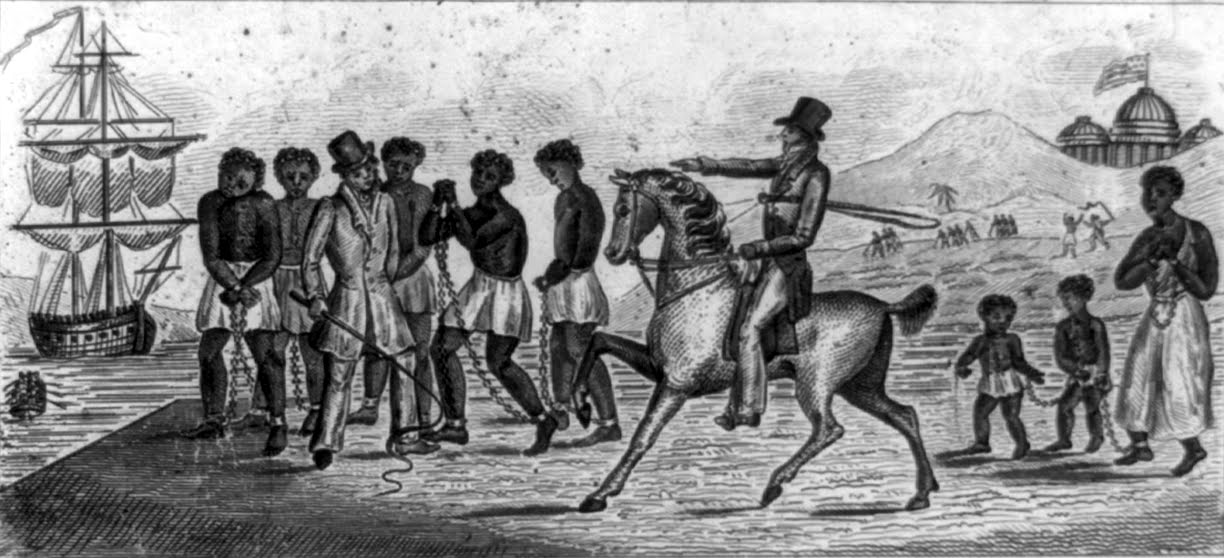A new film, 12 Years a Slave is attracting attention for its brutal depiction of slavery. But why have directors been reticent to tackle the subject until now? Tom Brook reports.
Slavery is a dark chapter in US history. And surprisingly few Americans seem to know the full horror of what the country’s slave population had to endure. Over the years Hollywood has been reluctant when it comes to filling in the details.
But is this down to audience disinterest – or is there a deeper issue? “There still are a lot of Americans in the marketplace who don’t really want to see the reality of slavery − and Hollywood being a business may be wary about showing too much of that,” says Screen International film critic David D’Arcy.
But now a forthcoming picture, the highly-praised 12 Years a Slave from British filmmaker Steve McQueen, is about to bring Americans what many view as the most realistic and bold portrayal of slavery ever seen on the big screen. It opens next week in US cinemas and it’s a film that could both educate and inspire − as well as alienate.
The film is based on the published memoir of Solomon Northup, a free black man from Saratoga Springs in New York who was kidnapped into slavery in 1841. Northup was stripped of his identity, given a new name and sent to toil on Louisiana’s plantations. The film shows his mistreatment − and that of his fellow slaves – in all its full horror.
Steve McQueen maintains he had a straightforward goal: “I just wanted to make a film about slavery because it was something which hadn’t been actually looked at before in depth − and it was just a gaping hole in film history and I thought I want to investigate. I want to look.”
That assertion has provoked the ire of the long-established New York film critic Armond White. “Anyone who believes that 12 Years a Slave is breaking new ground or has something new to say,” he says, “they’re probably unfamiliar with the fairly long history of movies that have dealt with slavery.”
In fact debates over slavery in cinema among directors, critics, scholars and the general public can get quite heated − and there is plenty of disagreement. “Slavery is a very controversial topic to discuss within American cinema,” says Professor Dexter Gabriel, who teaches a class on slavery in cinema at George Mason University. What many would accept is that the hodgepodge of Hollywood films that have tackled slavery have often featured negative representations of black people.
Characters or caricatures?
Professor Gabriel cites pictures like the 1939 classic Gone With The Wind: “Most movies that we’ve seen on slavery in American cinema have been the old plantation epics,” he says. “Hollywood depicted slavery where the slaves were depicted as happy, as jovial and in really demeaning stereotypes such as the Mammy or the Uncle Tom.”
But some will argue that these plantation epics weren’t always presenting slaves in a negative light. The Mammy, a caricature of an African-American matron that many find offensive, was famously portrayed by Hattie McDaniel in Gone With The Wind. But the character is viewed as well-drawn by critic Armond White. “Mammy is a full-blooded character, not a stereotype at all − and she stands equal to the white characters,” he says.
When it comes to portrayals of slavery many would agree that it wasn’t a story told on the big screen that had the most impact but Roots, a TV miniseries, broadcast in 1977.The series chronicled what happened to a young African sold into slavery and brought to the US −and half a century later its finale still holds the record as one of the highest-rated TV programmes in history.
Professor Gabriel points out that Roots presented slavery to the American public from a specific perspective − one which perhaps made it easier for viewers to relate to the plight of slaves. He says it was “a very middle-class version of slavery, where the slave experience is almost turned into an immigrant story so that it fits in with the United States.”
Armond White, in what many might see as an exaggeration, sees the impact of Roots as being dramatic. “I think it’s fair to say that before 1977 most Americans had no idea that slavery had ever existed,” he says. “They didn’t know what it was like at all, and Roots revealed all of that. It changed Americans’ perceptions of their own history.”
Slavery has also been tackled by Steven Spielberg, one of Hollywood’s greatest storytellers, both in his 1997 picture Amistad and in Lincoln, which was released last year. Amistad portrays a 19th Century mutiny by slaves who took control of the ship La Amistad off the coast of Cuba − as well as the legal battle that took place after their capture.
“I think Amistad is one of the great movies in Spielberg’s filmography,” says Armond White, “because it looks at slavery as an aspect of law in America and it examines the legal aspects that pertained to slavery. It’s about how men create laws and how men respond to laws.” But Spielberg’s Lincoln didn’t hold up so well in several assessments.
“We were treated to a film that was ostensibly talking slavery but was really about great white men who helped end slavery,” says Professor Gabriel.
Quentin Tarantino’s recent Django Unchained, a revenge fantasy in which a freed slave joins forces with a German bounty hunter to retaliate against an evil plantation owner, won two Oscars, critical raves and made a ton of money at the box office. But it has also been interpreted in less than flattering terms for its portrayal of slavery. Professor Gabriel is one of its critics. “In Django what we got was a very fantastical version of slavery based much more on modern notions of black masculinity and swagger than anything to do with the slave experience.”
“For me the problem with Django Unchained is that Tarantino seemed to make a joke of a very tragic history,” says Armond White. “He seemed not to take it seriously. He likes to play with movie tropes and Django Unchained is really his version of a 70s Blaxploitation film.”
Brutal reality
With 12 Years a Slave about to arrive in US cinemas some are asking if it will redress the balance and finally bring audiences a more accurate representation of slavery.
Variety’s chief film critic Scott Foundas admires the picture and thinks it will at least give audiences a hefty dose of reality. “I think 12 Years a Slave is unique in terms of motion pictures in trying to have this very plausible realism,” he says. “In terms of this kind of brutal realism it’s pretty much unparalleled in the history of American movies.”
And Screen International film critic David D’Arcy definitely welcomes a more visceral screen portrayal. “I think we want to see the blood and the grand emotion,” he says. “I don’t think the depiction of it is about the legalities or the shady evolution or anything like that.” But not everyone welcomes such a graphic approach. When asked about the picture’s brutality, Armond White, who is African-American, says he “felt sickened by it.”
He adds, “I think 12 Years a Slave is not very enlightening to me for someone who has heard about the history of slavery through personal anecdotes of family and community.”
Despite his protestations, the vast majority of US critics applaud this movie − and Oscars watchers believe it will earn a trove of nominations. But 12 Years a Slave’s more immediate concern is its fate at the box office. With so many Americans historically tentative when it comes to confronting the horrific details of slavery, will sufficient numbers want to see such a brutal portrayal when the film opens in the US next Friday?
Fox Searchlight Pictures, who’re backing the picture in America, are no doubt anxiously waiting to find out the answer. The article was originally by Tom Brook on the BBC Culture segment.











No portrayal of slavery on screen will make everybody happy. why? It was a terrible history for Africans brought to America in chains. That kind of tragedy can never make anybody happy, especially when in America there’s no longer a single racist, just people who love white people a little too much.
Armond White is an interesting character/critic. His take on Django Unchained is completelyh misplaced. I can have no respect for African Americans who feel the slave story can only be told by them. Do they want to tell the slave master’s story too?
The fact that film in this country has stagnated is plainly because they keep telling us the same stories over and over and refuse to tell the many other stories that will bring this country to accepting all. My take home message is that Hollywood is just another tool for the rich oppressive class and no matter how much we whim and whimper about what goes on the cinema screens, they will only espouse their parochial interests of brainwashing and indoctrinating America.
Hollywood is not yet done with telling the billions of stories and made-up stories about the Holocaust. There’s motivation here to keep doing just that because our country is controlled to those proportions. When they are done telling those stories about what a monster Adolf Hitler and the Nazis were, then maybe they will turn to the American Slavery narrative and expose the monstrosity that white supremacy was.
Perhaps, until African Americans come to dominate Hollywood, or if they form their own industry in Atlanta and prevent it from being hijacked by white money then maybe, just maybe, the real slave narrative will come to our screens. Until then, they are f-cked. What can I say?
Heard so much about 12 Years a Slave. Can wait to see what that has to say about our beloved country.
To show or not to show is definitely a dilemma. Not to show would be somewhat an erasure or revision of history but to show would mean that your movie might not make any money. I think most filmmakers would go after the money which is why its great to see that mcqueen is adhering to the social reality. And if he makes money then that’s a plus.
In Hollywood’s troubled history, from ‘Birth of a Nation’ to ‘Blood Diamonds,’ one thing is very clear, make epic movies about white people, cry over the holocaust and shit on black people. It is a simple equation that still works because at the end of the day Black money lies in the hands of athletes and entertainers who quite can’t seem to be able to manage their own affairs let alone that of a community. How can we expect such people to outwit their fellow whites and Jews who seem to employ them every step of the way?
The world, and America is a scramble for resources, those who understand it are at it day and night, those who may not be as brave, or just choose to ignore it, busy themselves in convincing the scramblers to share. It won’t happen. Hollywood is theirs and they do with it what they wish. Build yours, or scramble for it then you can do what you too wish with it. Period.
Very interesting article. I read the comments here and I feel this is one of those black blogs with class… some real issues being talked about here. Hollywood definitely needs to change or we must stop enriching them with out money – simple as ABC.